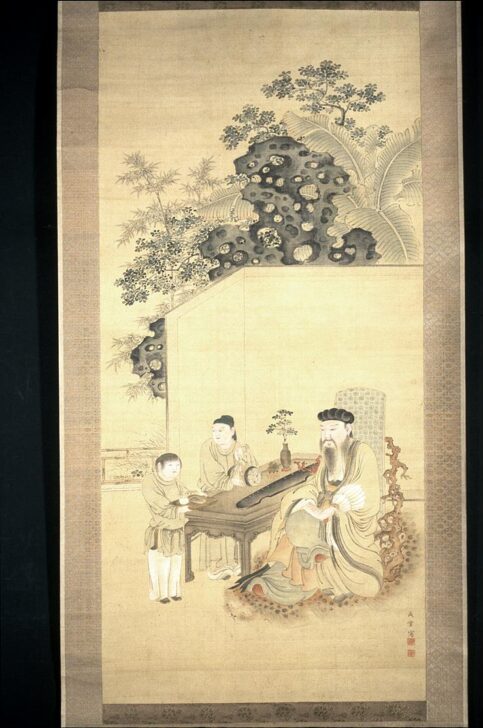Tao Yüan-ming
Nakabayashi Chikkei

Description
Gallery Rotation Winter 2013
Nakabayashi Chikkei
Japan, 1816–1867
Tao Yuanming in a Garden
Edo period (1615–1868)
circa 1840s–1867
Hanging scroll, ink and color on silk
Museum purchase made possible by the Margaret Watson Parker Art Collection Fund, 1982/1.197
Nakabayashi Chikkei was a painter of the Nanga School, which was modeled on the Chinese literati (amateur scholar-painter) tradition. Despite the policy of national isolation during the Edo period, members of the Nanga School learned about Chinese painting, poetry, and calligraphy through prints, publications, paintings and, occasionally, the Chinese painters allowed to reside near Dejima, the only official place of trade. Besides adopting literati painting styles, Chikkei also played Chinese music, composed and studied Chinese poetry and art, and drank steeped green tea.
The subject of this painting is the Chinese poet Tao Yuanming, famous for pastoral poems about nature and agrarian life. Though a qualified scholar-official, he rejected the rewards and obligations of a government position, preferring to devote himself to pastoral pursuits. Tao Yuanming’s renunciation of money and power and love of nature became the archetypal values for Chinese intellectuals and artists. In this painting he is attended by two pupils, one holding a tray with an ink stone, water, and brush, and the other holding a bundle of blank scrolls for the inscription of poems. Beside him is a guqin, a seven-string Chinese musical instrument of the zither family favored by scholars and literati.
Subject Matter:
The subject of this painting is the Chinese poet Tao Yuanming, famous for pastoral poems about nature and agrarian life. Though a qualified scholar-official, he rejected the rewards and obligations of a government position, preferring to devote himself to pastoral pursuits. Tao Yuanming’s renunciation of money and power and love of nature became the archetypal values for Chinese intellectuals and artists. In this painting he is attended by two pupils, one holding a tray with an ink stone, water, and brush, and the other holding a bundle of blank scrolls for the inscription of poems. Beside him is a guqin, a seven-string Chinese musical instrument of the zither family favored by scholars and literati.
Physical Description:
In the lower third of the hanging scroll are three figures. Tao Yuanming is the larger figure on the right with his two attendants on the left. They are divided by a table. In the background is a screen which separates the figures from the landscape.
Usage Rights:
If you are interested in using an image for a publication, please visit https://umma.umich.edu/request-image/ for more information and to fill out the online Image Rights and Reproductions Request Form.